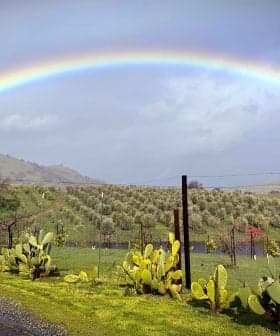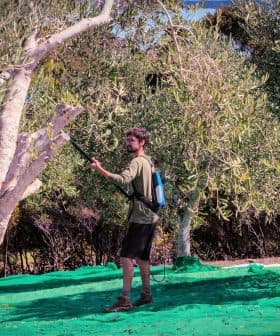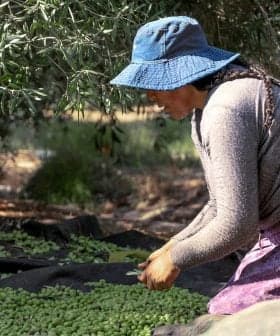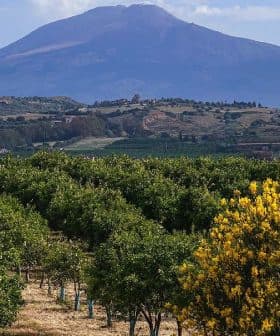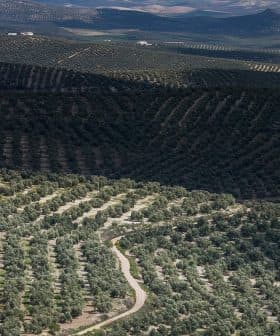State-of-the-Art Irrigation Management Leads to Rising Yields in California
To endure a changing climate, new approaches for managing and optimizing irrigation are paramount.
Meteorologists predict that California’s above-normal temperatures could worsen the state’s drought conditions. Olive producers in California are seeking solutions to manage water supply and optimize irrigation in the face of the dangerously hot summer. By implementing advanced irrigation systems and monitoring methods, producers like Cobram Estate aim to maximize water usage for robust yields while using 37 percent less water per ton of oil than the industry average.
According to the Sacramento Bee, meteorologists forecast that the above-normal temperatures in California could worsen the state’s drought condition.
California is having a dangerously hot summer. The National Oceanic and Atmospheric Administration (NOAA) seasonal outlook reveals a 33 to 60 percent chance that California’s weather will be hotter than usual for this period of the year.
You irrigate to fill the soil profile to values that no longer cause plant stress while being careful not to exceed the soil’s water holding capacity.
With hotter weather conditions on the horizon, olive producers seek solutions to manage water supply and optimize irrigation.
“At Cobram Estate, we firmly believe the food we eat and how we produce it will determine the health of people and the planet,” Leandro Ravetti, the company’s chief olive oil maker and co-chief executive, told Olive Oil Times.
See Also:Water Efficiency, Sustainability Must Go Hand in Hand in the Olive Grove“During the past 20 years, Cobram Estate and its Oliv.iQ growing system continuously implemented appropriate measures from both an agricultural and industrial point of view to maximize the efficient use of water,” he added.
Nathan Azevedo, founder and owner of WaterLab, told Olive Oil Times that installing and managing irrigation systems is one of the toughest tasks facing the Golden State’s farmers.
Azevedo sold most of the company to GrowWest in 2021 but continues to be involved as an owner. WaterLabs provides technology and consulting services for orchards and vineyards in the Northern Sacramento region.
With active data, Azevedo said growers are uniquely positioned to develop, manage, and monitor long-term water usage for successful harvests.
He described how the service helps growers decide when to start and how long to irrigate.
“We use plant-based instruments combined with soil moisture sensors to give the entire above and below-ground view of the growing system,” Azevedo said.
“Irrigation is complex,” he added. “Plant-based instruments, such as a pressure bomb, provide an indicator showing when a plant is stressed. Using this information, growers can irrigate when the plant starts to become stressed.”
“The next step is below-ground sensors, such as the soil moisture probe. This indication helps growers determine how long to continue irrigation,” Azevedo continued. “You irrigate to fill the soil profile to values that no longer cause plant stress while being careful not to exceed the soil’s water holding capacity.”
According to Azevedo, this holistic approach is necessary to maximize yield while using limited water resources as efficiently as possible.
“Most people don’t use any instruments to help them make irrigation decisions, or they use only one instrument and neglect the others,” he said. “Some farmers use evapotranspiration values to help estimate crop water loss while forgetting that the evapotranspiration calculation doesn’t account for your soil’s water holding capacity or infiltration rate.”
“If you apply water, you have calculated to have lost, but that water applied isn’t able to penetrate your clay soil or able to be held by your gravel soil, then your irrigation may be inadequately relieving the stress of your plants,” Azevedo added.
Some farmers may only use the pressure bomb to calculate stem water potential and the stress of their plants while forgetting that the below-ground soil system is the media from which their plants retrieve water.
“Focusing on only the above-ground system can cause the soil to become too severely depleted to values that are unrecoverable in the hot summer season and lead to a constant state of stress to the above-ground plant,” Azevedo said.
“The opposite, irrigating too long and overfilling the soil media to levels above field water holding capacity, could lead to anaerobic soil conditions that cause root diseases to flourish and the decline of the above-ground plant,” he added.
Furthermore, some farmers only use soil probes to help make irrigation decisions and neglect how their manipulation of soil moisture levels affects the stress of the above-ground plant.
See Also:Researchers in California Test New Solutions for Olive Fruit FlyWith California’s climate heating up, new technology unlocks the opportunity for optimizing harvests. Ravetti explained Cobram Estate’s key actions to maximize water usage for robust yields.
“[We’re implementing] irrigation systems according to comprehensive and exhaustive soil mapping,” Ravetti said. “This helps determine suitable areas for development and most appropriate valve designs and shift arrangements.”
He added that the company, one of the largest olive oil producers in the United States, has adopted sophisticated pressurized low-volume irrigation systems to minimize inefficiencies, state-of-the-art irrigation scheduling protocols and soil and tree monitoring systems to evaluate how irrigation affects each tree.
“[Cobram Estate also collaborated] with environmental groups to monitor and improve the environmental performance of its properties,” Ravetti said. “This included installation and regular monitoring of several piezometers [a device used to measure liquid pressure] to prevent deep leaching.”
He added that Cobram Estate’s proprietary Oliv.iQ system combines several elements to determine and monitor day-to-day irrigation decisions.
“We utilize weather stations and real-time climatic data to calculate evapotranspiration of the system while we monitor soil moisture levels through probes and direct feeling method and tree condition through trunk sensors and pressure chambers,” Ravetti said. “All this information is complemented by regular satellite imagery and aerial photography of our farms, allowing us to follow the evolution of most common crop growth indexes.”
“Because of the adoption of these more sustainable and efficient agricultural practices, as well as significantly higher yields (in gallons of oil per acre) than the industry average, it is estimated our olive orchards produce olive oil with a consumption of water 37 percent lower per ton of oil than the industry average,” he added.
Traditionally, olives have been grown as a non-irrigated crop well suited to Mediterranean dryland. This demonstrates acceptable production levels with little interference while possessing the ability to survive prolonged periods of drought.
“Research has shown well-managed groves with proper irrigation produce a considerable increase in olive grove yields,” Ravetti said. “Olives as a crop, and extra virgin olive oil as a product, are perfectly positioned to play a critical role in sustainable food production and elevate the adoption of sustainable and healthy diets.”
“Additionally, when it comes down to water usage, olives maintain one of the lowest water requirements using 30 to 50 percent less water than most nut and fruit trees,” Ravetti added.
Integrated water management encompasses strategic irrigation technologies, water quality and crop nutrition and may enable growers to hit the water bullseye in their orchards, vineyards and olive groves.
“It is, in our opinion, a holistic approach that uses multiple instruments and sensors to help make the best irrigation management decisions,” Azevedo said.
One of the key measurements is the pressure bomb. The pressure bomb measures how hard the plant is pulling on soil moisture. As soil water depletes, the harder the plant has to pull to retrieve moisture from the soil until it eventually pulls too hard, wilts and dies.
“It is like your blood pressure,” Azevedo said. “If your blood pressure is too high, your heart becomes stressed and has to pump too hard to retrieve blood from its veins and send it out through its arteries, eventually leading to the possibility of heart attack and death.”
“Low free-flowing blood and pressure bomb values lead to healthy, happy plants and people,” Azevedo said. “Healthy, vigorously growing plants lead to the monster crops that bring in the revenue to keep our farms in business.”
Share this article


